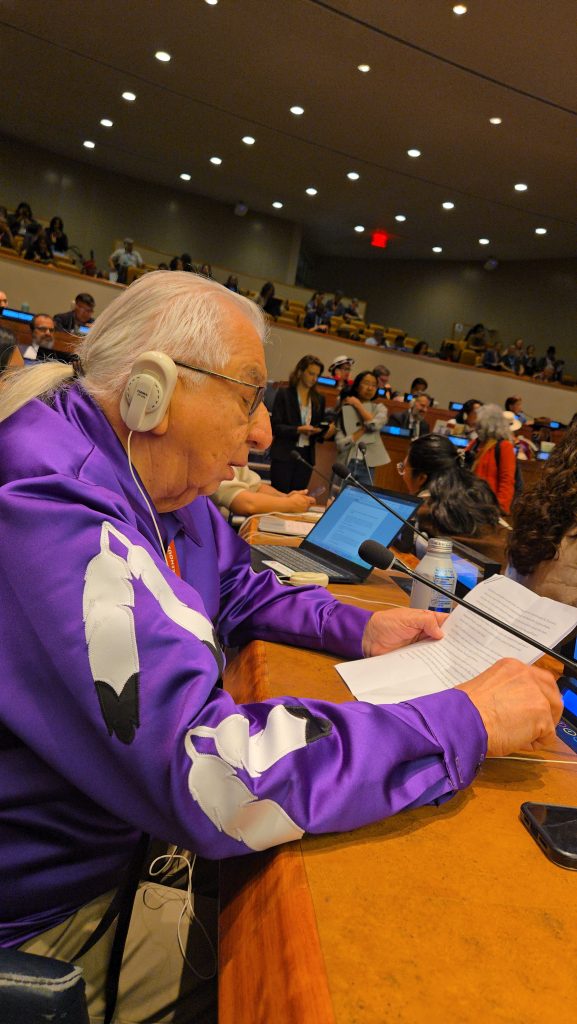
Agenda Item 4 Discussion on the six mandated areas of the Permanent Forum (economic and social development, culture, environment, education, health and human rights), with reference to the United Nations Declaration on the Rights of Indigenous Peoples and the 2030 Agenda for Sustainable Development – Impact of colonization and armed conflicts on Indigenous Peoples’ rights: the imperative of peacebuilding
Joint Statement from the Coalition for the Human Rights of Indigenous Peoples in Canada, including:
Brenda Gunn; Cheryl Knockwood; Chief Edward John; Katsi’tsakwas Ellen Gabriel; Kenneth Deer; Kirby Muldoe; Laurie Buffalo; Lea Nicholas Mackenzie; Mariam Wallet Aboubakrine; Professor Sheryl Lightfoot, University of Toronto; International Chief Wilton Littlechild
The Coalition for the Human Rights of Indigenous Peoples in Canada commends the Permanent Forum for their report: Impact of colonization and armed conflicts on Indigenous Peoples’ rights: the imperative of peacebuilding.
While all 7 recommendations are essential, we would like to emphasize two in particular:
- Recommendation 5 – calling on all states to empower Indigenous Peoples to be active participants in peacebuilding, governance and resource management processes – is especially important in the many contexts around the globe where Indigenous Peoples are impacted by armed conflict. Active participation in decision-making is an essential component of the right to self-determination. Measures to ensure active participation of Indigenous Peoples must be implemented in a manner consistent with the standard of free, prior and affirmed consent as affirmed in the UN Declaration on the Rights of Indigenous Peoples.
- Recommendation 7 calls on states to operationalize the UN Declaration and integrate it into national legislation. Operationalization must also include the development, in consultation and cooperation with Indigenous Peoples, of comprehensive national action plans to fully implement the Declaration.
The General Assembly made a strong commitment to Indigenous peacebuilding in their December 2024 resolution (A/79/455). Recognizing the importance of meaningfully engaging Indigenous Peoples in peace agreement negotiations, transitional justice processes, conflict resolution, mediation and constructive arrangements is commendable. However, recognition is not enough, meaningful engagement also requires respect. Implementation legislation and national action plans are important tools to operationalize the UN Declaration. Such plans must be developed in cooperation and consultation with Indigenous Peoples in accordance with the standard of free, prior, and informed consent. They must also include concrete action items with appropriate timelines for the fulfillment of all seven of the Permanent Forum’s recommendations on Peacebuilding.
Peacebuilding is a critical theme of the UN Declaration that responds to the urgent needs of Indigenous Peoples around the world who are caught in the middle of armed conflict and continue to experience violent invasions and occupation of their lands.
Article 7.2 of the UN Declaration recognizes the collective right of all Indigenous Peoples to live in freedom, peace and security as distinct peoples not subject to any act of genocide or any act of violence. Likewise, in Article 30, the Declaration clearly condemns the unjust militarization of Indigenous Peoples lands or territories. Land dispossession through conquest, urbanization, and development are also sources of conflict faced by Indigenous Peoples globally alongside widespread criminalization of land defenders.
As states work to accomplish sustainable development goal 16, to promote peaceful and inclusive societies, Indigenous Peacebuilding must be a part of this effort. Many Indigenous commentators have noted that although Indigenous Peoples are clearly central to the SDGs and their implementation, key targets do not accurately reflect Indigenous Peoples’ laws and protocols, or rights. Interpreting the SDGs so that they are consistent with the minimum standards set out in the UN Declaration can help fill these gaps and resolve potential concerns.
Thank you.
You can find a PDF version of this statement here.